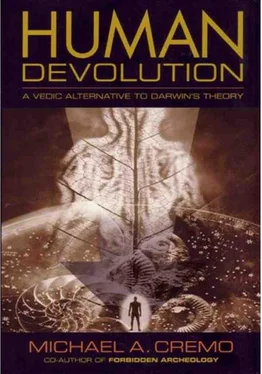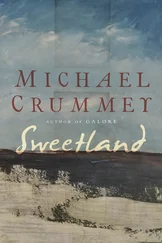Michael Cremo - Human Devolution - A Vedic Alternative To Darwin's Theory
Здесь есть возможность читать онлайн «Michael Cremo - Human Devolution - A Vedic Alternative To Darwin's Theory» весь текст электронной книги совершенно бесплатно (целиком полную версию без сокращений). В некоторых случаях можно слушать аудио, скачать через торрент в формате fb2 и присутствует краткое содержание. Год выпуска: 2003, ISBN: 2003, Издательство: Torchlight Publishing, Жанр: Старинная литература, на английском языке. Описание произведения, (предисловие) а так же отзывы посетителей доступны на портале библиотеки ЛибКат.
- Название:Human Devolution: A Vedic Alternative To Darwin's Theory
- Автор:
- Издательство:Torchlight Publishing
- Жанр:
- Год:2003
- ISBN:9780892133345
- Рейтинг книги:4 / 5. Голосов: 1
-
Избранное:Добавить в избранное
- Отзывы:
-
Ваша оценка:
- 80
- 1
- 2
- 3
- 4
- 5
Human Devolution: A Vedic Alternative To Darwin's Theory: краткое содержание, описание и аннотация
Предлагаем к чтению аннотацию, описание, краткое содержание или предисловие (зависит от того, что написал сам автор книги «Human Devolution: A Vedic Alternative To Darwin's Theory»). Если вы не нашли необходимую информацию о книге — напишите в комментариях, мы постараемся отыскать её.
Human Devolution: A Vedic Alternative To Darwin's Theory — читать онлайн бесплатно полную книгу (весь текст) целиком
Ниже представлен текст книги, разбитый по страницам. Система сохранения места последней прочитанной страницы, позволяет с удобством читать онлайн бесплатно книгу «Human Devolution: A Vedic Alternative To Darwin's Theory», без необходимости каждый раз заново искать на чём Вы остановились. Поставьте закладку, и сможете в любой момент перейти на страницу, на которой закончили чтение.
Интервал:
Закладка:
Sukla developed a strong attraction for Haridhan chakravarty, the husband of Mana. He confirmed Sukla’s story about going to a movie. To some readers, accustomed to going to many movies a year, this might seem trivial. But Stevenson (1974, p. 58) states: “The occasion was memorable because it was the only time Mana ever went to a movie in her life, and she and her husband were afterwards reproached by her stepmother-in-law.” Sukla looked forward to visits from Haridhan chakravarty (he came several times). Whenever Sukla met Minu, she always showed extreme affection and always adopted the role of mother, even though Sukla was smaller and younger than Minu (Stevenson 1974, p. 57). Once, a member of the Pathak family who was visiting Sukla in Kampa told her, falsely, that Minu was very ill. Sukla wept until she was assured that Minu was not really sick. “On another occasion,” stated Stevenson (1974, p. 57) “when Minu really was ill and news of this reached Sukla, she became extremely distressed, wept, and demanded to be taken to Bhatpara to see Minu. Her family could not quiet her until they actually took her the next day to see Minu, who was by then better.”
Stevenson carefully considered the possibility that the two families could have been in communication with each other, thus providing a normal explanation for the knowledge displayed by Sukla. Stevenson stated (1984, p. 54): “The members of the two principal families concerned in the case denied that they ever had any knowledge of the other family prior to the attempts to verify Sukla’s statements.” The Guptas came to Kampa only in 1951, from East Bengal. Sukla’s father had visited Bhatpara only once, to give a magic show at a school. The chakravarty and Pathak families were long time residents of Bhatpara. Their denial of any contact with the Guptas is reinforced by the caste difference between the families. The chakravartys and Pathaks were of the brahmana caste while the Guptas were of one of the mercantile castes, the Banias. Sukla did not like to eat with the other children in her family. When she was three years old, she would say to them, “Why should I eat with you? I am a Brahmin” (Stevenson 1974, p. 57).
S. c. Pal, K. n. Sen Gupta’s railway coworker, lived near Bhatpara, but he did not know anything about the charkravarty and Pathak families until Gupta told him the story of his daughter’s recollections of having lived in Bhatpara. At this time, Pal had known Gupta for only one month, and had never visited the Gupta house. So he could not possibly have been the source of the knowledge Sukla had been demonstrating for years prior to this (Stevenson 1974, p. 55). Another possible channel of information was Atul dhar, another coworker of Sukla’s father, who did have some slight contact with the chakravarty family in Bhatpara. But Stevenson (1974, p. 55) noted that “Sri Atul dhar never discussed the chakravarty family with Sri Sen Gupta.”
Here is another of Stevenson’s cases. Imad Elawar was born in 1958, in the village of Kornayel, Lebanon. His family belonged to the druse, an Islamic sect that accepts reincarnation. from the time he was two years old, Imad began telling of a previous life in the village of Khriby, in a family of the name Bouhamzy. He often spoke of someone with the first name Mahmoud. Other male persons he spoke of were Amin, Adil, Talil (or Talal), Said, Toufic, Salim, and Kemal. Imad also mentioned a female name, Mehibeh. Imad’s father did not like these revelations and scolded his son for telling lies. But Imad’s mother and grandparents were sympathetic. When Imad was still two years old, Salim el Aschkar happened to visit Kornayel. He was a resident of Khriby. Imad’s grandmother testified that when Imad saw Salim, he rushed up to him and put his arms around him. “do you know who I am?” asked Salim. Imad replied, “Yes, you were my neighbor” (Stevenson 1974, p. 276). Salim el Aschkar had in fact been a neighbor of a deceased member of the Bouhamzy family. Shortly thereafter, Imad’s parents met a woman who lived in a village near Khriby. She confirmed that people with the same names as those mentioned by Imad did live there (Stevenson 1974, p. 276). In december of 1963, Imad’s father attended a funeral in Khriby, and some of the people he met pointed out to him two men with names mentioned by Imad. This was his first visit to Khriby, and he did not at that time speak to any member of the Bouhamzy family. Imad displayed unusual behaviors. As a child, the very first word that Imad uttered was Jamileh, the name of a woman, apparently known to him from his previous life. He described her beauty and her taste for Western clothes. In many ways, he made known his attraction for this beautiful woman, showing an interest far beyond his young age of two or three years. Imad avoided children of his own age, and had a liking for strong tea and coffee, just like the village men. He would often ask his father to take him hunting. He indicated that in his previous life, he had a double barreled shotgun and a rifle. He said he had hidden his rifle in his house. In school, he was unusually quick in learning french. When a sister was born, he asked that she be named Huda. He also had a phobia of buses and trucks. He spoke repeatedly of two accidents. In one, a man driving a truck got into a wreck and lost his legs. There had been a quarrel between the man who lost his legs and the driver. In the second accident, Imad was the driver of a bus that got into an accident when for some reason he was not driving it. He also described the house in which he had lived. As a child, Imad often said he was very happy that he could walk. From all of these things, Imad’s parents concluded he had once lived in Khriby and that his name in his past life was Mahmoud Bouhamzy, who had a beautiful wife named Jamileh. The man had died after a truck hit him, causing him to lose both his legs. This had happened as a result of a quarrel with the truck driver. They also concluded that some of the names he mentioned were those of his sons, brothers, and other relatives. for example, they concluded he had a brother named Amin who lived in Tripoli and worked at the Tripoli courthouse. He had another brother Said. He had two sons, Adil and Talil (or Talal). He had another two sons, Kemal and Salim. He had a friend called Yousef el Halibi, and another called Ahmed el Halibi. He had a sister named Huda.
In 1962, Stevenson learned of the case from an informant, and in 1964 went to Lebanon to meet the Elawars. In March 1964, when Imad was five and a half years old, Stevenson took him and his father from their home in Kornayel to Khriby. Kornayel is in the mountains fifteen miles east of Beirut. Khriby lies 25 miles south from Kornayel. A distant relative of the Elawar family knew the Bouhamzy family. But Imad’s father told Stevenson that this relative had never mentioned anything about the Bouhamzys.
When Stevenson, Imad, and his father got to Khriby on March 17, 1964, Stevenson interviewed a limited number of informants. Two residents said that in June 1943 a member of the Bouhamzy family died after having been run over by a truck. It was, however, not Mahmoud but Said Bouhamzy. As far as Jamileh was concerned, she was, they said, not the wife of Said Bouhamzy. On this visit, Stevenson managed to locate Yousef el Halibi, who was by this time quite old and ill. He said he had been a friend of Said Bouhamzy. Stevenson (1974, p. 279) stated: “On this occasion Imad pointed correctly in the direction of the house he claimed to have lived in, and made a couple of other statements suggesting paranormal knowledge of the village, but did not meet any members of the Bouhamzy family.”
The next day Stevenson returned to Khriby, but without Imad and his father. He received additional confirmation that Said Bouhamzy had no connection with Jamileh. He also learned that the descriptions Imad had given of the house he had lived in did not match the house of Said Bouhamzy. furthermore, there was already a man who claimed to have been Said Bouhamzy in a previous life.
Читать дальшеИнтервал:
Закладка:
Похожие книги на «Human Devolution: A Vedic Alternative To Darwin's Theory»
Представляем Вашему вниманию похожие книги на «Human Devolution: A Vedic Alternative To Darwin's Theory» списком для выбора. Мы отобрали схожую по названию и смыслу литературу в надежде предоставить читателям больше вариантов отыскать новые, интересные, ещё непрочитанные произведения.
Обсуждение, отзывы о книге «Human Devolution: A Vedic Alternative To Darwin's Theory» и просто собственные мнения читателей. Оставьте ваши комментарии, напишите, что Вы думаете о произведении, его смысле или главных героях. Укажите что конкретно понравилось, а что нет, и почему Вы так считаете.












